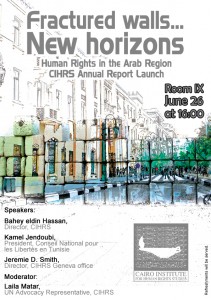 In a side event at the 20th session of the UN Human Rights Council in Geneva, CIHRS sponsored a re-launch of its annual report on the state of human rights in the Arab world, originally released in Cairo on June 4. The report, titled “Fractured Walls, New Horizons,” was welcomed by the more than 50 attendees at the event, among them representatives of Egypt, Tunisia, Australia, Switzerland, Poland, Denmark, Ireland, and the Maldives, as well as several international organizations. The speakers at the seminar were CIHRS president Kamal Jendoubi, CIHRS director Bahey eldin Hassan, and representatives from CIHRS’ International Advocacy Program Jeremie Smith and Laila Matar.
In a side event at the 20th session of the UN Human Rights Council in Geneva, CIHRS sponsored a re-launch of its annual report on the state of human rights in the Arab world, originally released in Cairo on June 4. The report, titled “Fractured Walls, New Horizons,” was welcomed by the more than 50 attendees at the event, among them representatives of Egypt, Tunisia, Australia, Switzerland, Poland, Denmark, Ireland, and the Maldives, as well as several international organizations. The speakers at the seminar were CIHRS president Kamal Jendoubi, CIHRS director Bahey eldin Hassan, and representatives from CIHRS’ International Advocacy Program Jeremie Smith and Laila Matar.
The panel began yesterday, June 27, at 4 pm with a presentation by Laila Matar, who noted that this annual report, CIHRS’s fourth, is unique, given that the period it covers witnessed the eruption of revolutions seeking democracy in the Arab world. The report documents and analyzes the state of human rights in the Arab world in 2011 in 12 countries: Egypt, Tunisia, Algeria, Morocco, Iraq, Syria, Lebanon, Bahrain, Saudi Arabia, and the occupied Palestinian territories.
Referring to the title of the report, Matar said that the fracturing of walls of fear was the most significant development seen in the past year. This is represented on the report’s cover by the photo of the concrete walls put in place by the Egyptian armed forces to contain demonstrators. In response, the protestors painted the walls with murals of a new, open street, breaking through the barriers into freedom.
Introducing the annual report, Bahey eldin Hassan stated that a year after the beginning of the Arab Spring, it seems that the peoples who rose up in 2011 stand before only two choices: limited reform of old regimes or transition to theocracies—neither of which, he feared, would be able to deliver real democracy. Hassan focused on the situation in Egypt over the last year, noting the escalating rights abuses under military rule and reviewing the most significant failures of the transitional period, including the increasing repression of critics of the Supreme Council of the Armed Forces, the return of brutal suppression of peaceful protests, growing pressure on independent media, and the unprecedented assault on human rights groups and civil society.
Kamal Jendoubi spoke about the human rights situation in Syria and Tunisia, reviewing the main points highlighted by the report for these two countries. He said that the revolutionary uprisings in these countries dealt painful blows to systems of entrenched family rule and the inheritance of power by removing long-standing symbols of tyranny in Tunisia and Egypt. In Syria, he said, it is difficult for the regime to find a political exit that would grant it the legitimacy to remain in power in the midst of the bloodbath that has alienated it from its people.
Jeremie Smith focused on the UN engagement with the uprisings of the Arab Spring, saying that the balance of power within the Human Rights Council had been exposed and the political considerations of its members revealed. There was clear evidence of double standards at work, he said, citing the example of the differing tactics pursued by the Council in the situations of Syria and Bahrain. Although the uprisings in both countries were met with repression, the GCC countries impeded any resolutions on Bahrain and even blocked all discussion of the situation in the Council, exercising clear control over the agenda of the UN Human Rights Council in matters related to Arab countries. This also explains the focus of the Council on the situation in Syria; while various special sessions have been convened on Syria and several fact-finding commissions sent, the Council continues to disregard the deteriorating situation in Bahrain.
Smith noted the UN’s increasing attention to the ongoing rights situations in Arab countries which imposed themselves on the Council’s agenda during the 2011 Arab Spring. Smith demanded an end to double standards and special interests for the sake of promoting human rights in all countries of the world and in order to preserve the credibility of the Council and allow it to fulfill its mission.
To read the annual report:
In English: https://cihrs.org/wp-content/uploads/2012/06/the-report-e.pdf
Share this Post

